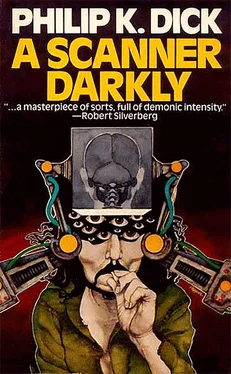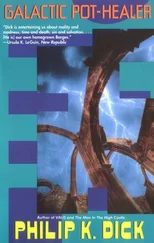You really are, he agreed. Spaced, wired, burned out and strung-out and fucked. Completely fucked. He felt like laughing.
“We’ll get you over there to her—” Hank began, and then shifted his attention to the phone, saying, “Hey, Donna, this is a buddy of Bob’s, you know? Hey, man, he’s in a bad way, I’m not jiving you. Hey, he—”
I can dig it, two voices thought inside his mind in unison as he heard his buddy laying it on Donna. And don’t forget to tell her to bring me something; I’m really hunting. Can she score for me or something? Maybe supercharge me, like she does? He reached out to touch Hank but could not; his hand fell short.
“I’ll do the same for you sometime,” he promised Hank as Hank hung up.
“Just sit there until the car’s outside. I’ll put through the call now.” Again Hank phoned, this time saying, “Motor pool? I want an unmarked car and officer out of uniform. What do you have available?”
They, inside the scramble suit, the nebulous blur, shut their eyes to wait.
“It might be I should get you taken to the hospital,” Hank said. “You’re very bad off; maybe Jim Barris poisoned you. We really are interested in Barris, not you; the scanning of the house was primarily to keep on Barris. We hoped to draw him in here … and we did.” Hank was silent. “So that’s why I knew pretty well that his tapes and the other items were faked. The lab will confirm. But Barris is into something heavy. Heavy and sick, and it has to do with guns.”
“I’m a what, then?” he said suddenly, very loud.
“We had to get to Jim Barris and set him up.”
“You fuckers,” he said.
“The way we arranged it, Barris—if that’s who he is—got progressively more and more suspicious that you were an undercover police agent, about to nail him or use him to get higher. So he—”
The phone rang.
“All right,” Hank said later. “Just sit, Bob. Bob, Fred, whatever. Take comfort—we did get the bugger and he’s a—well, what you just now called us. You know it’s worth it. Isn’t it? To entrap him? A thing like that, whatever it is he’s doing?”
“Sure, worth it.” He could hardly speak; he grated mechanically.
Together they sat.
***
On the drive to New-Path, Donna pulled off the road where they could see the lights below, on all sides. But the pain had started for him now; she could see that, and there wasn’t much time left. She had wanted to be with him one more time. Well, she had waited too long. Tears ran down his cheeks, and he had started to heave and vomit.
“We’ll sit for a few minutes,” she told him, guiding him through the bushes and weeds, across the sandy soil, among the discarded beer cans and debris. “I—”
“Do you have your hash pipe?” he managed to say.
“Yes,” she said. They had to be far enough from the road not to be noticed by the police. Or at least far enough so they could ditch the hash pipe if an officer came along. She would see the police car park, its lights off, covertly, a way off, and the officer approach on foot. There would be time.
She thought, Time enough for that. Time enough to be safe from the law. But no time any more for Bob Arctor. His time—at least if measured in human standards—had run out. It was another kind of time which he had entered now. Like, she thought, the time a rat has: to run back and forth, to be futile. To move without planning, back and forth, back and forth. But at least he can still see the lights below us. Although maybe for him it doesn’t matter.
They found a sheltered place, and she got out the foilwrapped fragment of hash and lit the hash pipe. Bob Arctor, beside her, did not seem to notice. He had dirtied himself but she knew he could not help it. In fact, he probably didn’t even know it. They all got this way during withdrawal.
“Here.” She bent toward him, to supercharge him. But he did not notice her either. He just sat doubled up, enduring the stomach cramps, vomiting and soiling himself, shivering, and crazily moaning to himself, a kind of song.
She thought then of a guy she had known once, who had seen God. He had acted much like this, moaning and crying, although he had not soiled himself. He had seen God in a flashback after an acid trip; he had been experimenting with water-soluble vitamins, huge doses of them. The orthomoleculan formula that was supposed to improve neural firing in the brain, speed it up and synchronize it. With that guy, though, instead of merely becoming smarten, he had seen God. It had been a complete surprise to him.
“I guess,” she said, “we never know what’s in stone for us.”
Beside her, Bob Arctor moaned and did not answer.
“Did you know a dude named Tony Amsterdam?”
There was no response.
Donna inhaled from the hash pipe and contemplated the lights spread out below them; she smelled the air and listened. “After he saw God he felt really good, for around a year. And then he felt really bad. Worse than he ever had before in his life. Because one day it came over him, he began to realize, that he was never going to see God again; he was going to live out his whole remaining life, decades, maybe fifty years, and see nothing but what he had always seen. What we see. He was worse off than if he hadn’t seen God. He told me one day he got really mad; he just freaked out and started cursing and smashing things in his apartment. He even smashed his stereo. He realized he was going to have to live on and on like he was, seeing nothing. Without any purpose. Just a lump of flesh grinding along, eating, drinking, sleeping, working, crapping.”
“Like the rest of us.” It was the first thing Bob Arctor had managed to say; each word came with retching difficulty.
Donna said, “That’s what I told him. I pointed that out. We were all in the same boat and it didn’t freak the rest of us. And he said, ‘You don’t know what I saw. You don’t know.’ ”
A spasm passed through Bob Arctor, convulsing him, and then he choked out, “Did … he say what it was like?”
“Sparks. Showers of colored sparks, like when something goes wrong with your TV set. Sparks going up the wall, sparks in the air. And the whole world was a living creature, whenever he looked. And there were no accidents: everything fitted together and happened on purpose, to achieve something—some goal in the future. And then he saw a doorway. For about a week he saw it whenever he looked—inside his apartment, outdoors when he was walking to the store or driving. And it was always the same proportions, very narrow. He said it was very—pleasing. That’s the word he used. He never tried to go through it; he just looked at it, because it was so pleasing. Outlined in vivid red and gold light, he said. As if the sparks had collected into lines, like in geometry. And then after that he never saw it again his whole life, and that’s what finally made him so fucked up.”
After a time Bob Arctor said, “What was on the other side?”
Donna said, “He said there was another world on the other side. He could see it.”
“He … never went through it?”
“That’s why he kicked the shit out of everything in his apartment; he never thought of going through it, he just admired the doorway and then later he couldn’t see it at all and it was too late. It opened for him a few days and then it was closed and gone forever. Again and again he took a whole lot of LSD and those water-soluble vitamins, but he never saw it again; he never found the combination.”
Bob Arctor said, “What was on the other side?”
“He said it was always nighttime.”
“Nighttime!”
“There was moonlight and water, always the same. Nothing moved or changed. Black water, like ink, and a shordane, a beach of an island. He was sure it was Greece, ancient Greece. He figured out the doorway was a weak place in time, and he was seeing back into the past. And then later on, when he couldn’t see it any more, he’d be on the freeway driving along, with all the trucks, and he’d get madder than hell. He said he couldn’t stand all the motion and noise, everything going this way and that, all the clanking and banging. Anyhow, he never could figure out why they showed him what they showed him. He really believed it was God, and it was the doorway to the next world, but in the final analysis all it did was mess up his head. He couldn’t hold on to it so he couldn’t cope with it. Every time he met anybody, after a while he’d tell them he’d lost everything.”
Читать дальше








